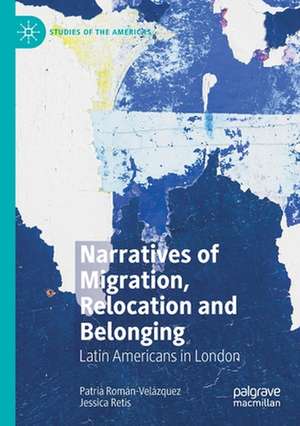Narratives of Migration, Relocation and Belonging: Latin Americans in London: Studies of the Americas
Autor Patria Román-Velázquez, Jessica Retisen Limba Engleză Paperback – 15 aug 2021
| Toate formatele și edițiile | Preț | Express |
|---|---|---|
| Paperback (1) | 357.57 lei 3-5 săpt. | +18.19 lei 10-14 zile |
| Springer International Publishing – 15 aug 2021 | 357.57 lei 3-5 săpt. | +18.19 lei 10-14 zile |
| Hardback (1) | 388.13 lei 6-8 săpt. | |
| Springer International Publishing – 14 aug 2020 | 388.13 lei 6-8 săpt. |
Din seria Studies of the Americas
-
 Preț: 305.50 lei
Preț: 305.50 lei -
 Preț: 312.10 lei
Preț: 312.10 lei -
 Preț: 308.36 lei
Preț: 308.36 lei -
 Preț: 303.28 lei
Preț: 303.28 lei - 20%
 Preț: 566.72 lei
Preț: 566.72 lei -
 Preț: 300.85 lei
Preț: 300.85 lei -
 Preț: 298.66 lei
Preț: 298.66 lei -
 Preț: 389.70 lei
Preț: 389.70 lei -
 Preț: 394.12 lei
Preț: 394.12 lei -
 Preț: 388.72 lei
Preț: 388.72 lei -
 Preț: 388.72 lei
Preț: 388.72 lei -
 Preț: 388.72 lei
Preț: 388.72 lei -
 Preț: 389.31 lei
Preț: 389.31 lei -
 Preț: 389.70 lei
Preț: 389.70 lei - 15%
 Preț: 697.65 lei
Preț: 697.65 lei -
 Preț: 392.60 lei
Preț: 392.60 lei -
 Preț: 384.31 lei
Preț: 384.31 lei - 18%
 Preț: 736.81 lei
Preț: 736.81 lei -
 Preț: 390.25 lei
Preț: 390.25 lei -
 Preț: 394.51 lei
Preț: 394.51 lei - 18%
 Preț: 733.46 lei
Preț: 733.46 lei -
 Preț: 382.57 lei
Preț: 382.57 lei -
 Preț: 393.74 lei
Preț: 393.74 lei -
 Preț: 388.72 lei
Preț: 388.72 lei -
 Preț: 391.61 lei
Preț: 391.61 lei -
 Preț: 388.72 lei
Preț: 388.72 lei -
 Preț: 383.71 lei
Preț: 383.71 lei -
 Preț: 391.40 lei
Preț: 391.40 lei -
 Preț: 390.08 lei
Preț: 390.08 lei -
 Preț: 388.72 lei
Preț: 388.72 lei - 15%
 Preț: 642.36 lei
Preț: 642.36 lei -
 Preț: 392.75 lei
Preț: 392.75 lei - 15%
 Preț: 503.37 lei
Preț: 503.37 lei -
 Preț: 392.37 lei
Preț: 392.37 lei - 15%
 Preț: 638.43 lei
Preț: 638.43 lei -
 Preț: 386.81 lei
Preț: 386.81 lei -
 Preț: 387.75 lei
Preț: 387.75 lei - 15%
 Preț: 635.65 lei
Preț: 635.65 lei -
 Preț: 388.52 lei
Preț: 388.52 lei -
 Preț: 392.60 lei
Preț: 392.60 lei -
 Preț: 388.72 lei
Preț: 388.72 lei -
 Preț: 388.72 lei
Preț: 388.72 lei - 15%
 Preț: 644.30 lei
Preț: 644.30 lei
Preț: 357.57 lei
Nou
Puncte Express: 536
Preț estimativ în valută:
68.43€ • 71.01$ • 57.19£
68.43€ • 71.01$ • 57.19£
Carte disponibilă
Livrare economică 22 februarie-08 martie
Livrare express 11-15 februarie pentru 28.18 lei
Preluare comenzi: 021 569.72.76
Specificații
ISBN-13: 9783030534462
ISBN-10: 3030534464
Pagini: 206
Ilustrații: XIII, 206 p. 6 illus., 4 illus. in color.
Dimensiuni: 148 x 210 x 15 mm
Greutate: 0.3 kg
Ediția:1st ed. 2021
Editura: Springer International Publishing
Colecția Palgrave Macmillan
Seria Studies of the Americas
Locul publicării:Cham, Switzerland
ISBN-10: 3030534464
Pagini: 206
Ilustrații: XIII, 206 p. 6 illus., 4 illus. in color.
Dimensiuni: 148 x 210 x 15 mm
Greutate: 0.3 kg
Ediția:1st ed. 2021
Editura: Springer International Publishing
Colecția Palgrave Macmillan
Seria Studies of the Americas
Locul publicării:Cham, Switzerland
Cuprins
Chapter 1. Introduction: Narratives of migration, relocation and belonging.- Chapter 2. Migration, transnationalism and diasporic identities.- Chapter 3. Latin American immigration to Europe: The case of London.- Chapter 4. Narratives of migration and relocation.- Chapter 5. Narratives of migration around work.- Chapter 6. Latino media spaces in London: The interstices of the invisible.- Chapter 7. Latin Urbanisms: Resisting gentrification, reclaiming urban spaces.- Chapter 8. British Latinidad as social and spatial justice.
Notă biografică
Patria Román-Velázquez is Senior Lecturer at the Institute for Media and Creative Industries at Loughborough University, United Kingdom.
Jessica Retis is Associate Professor in the School of Journalism and Affiliated Faculty with the Center for Latin American Studies at The University of Arizona, United States.
Jessica Retis is Associate Professor in the School of Journalism and Affiliated Faculty with the Center for Latin American Studies at The University of Arizona, United States.
Textul de pe ultima copertă
This book gives voice to the diverse diasporic Latin American communities living in the UK by exploring first and onward migration of Latin Americans to Europe, with a specific reference to London. The authors discuss how networks of solidarity and local struggles are played out, enacted, negotiated and experienced in different spatial spheres, whether this be migration routes into London, work spaces, diasporic media and urban places. Each of these spaces are explored in separate chapters to argue that transnational networks of solidarity and local struggles are facilitating renewed sense of belongingness and claims to the city. In this context we witness manifestations of British Latinidad that invoke new forms of belongingness beyond and against old colonial powers.
Patria Román-Velázquez is Senior Lecturer at the Institute for Media and Creative Industries at Loughborough University, United Kingdom.
Jessica Retis is Associate Professor in the School of Journalism and Affiliated Faculty with the Center for Latin American Studies at The University of Arizona, United States.
Jessica Retis is Associate Professor in the School of Journalism and Affiliated Faculty with the Center for Latin American Studies at The University of Arizona, United States.
Caracteristici
Looks at the diverse diasporic Latin American communities living in the UK Focuses on the how the city of London helps these communities forms creative networks of solidarity Argues that these new forms of solidarity across diasporic communities facilitate a sense of belonging ?
